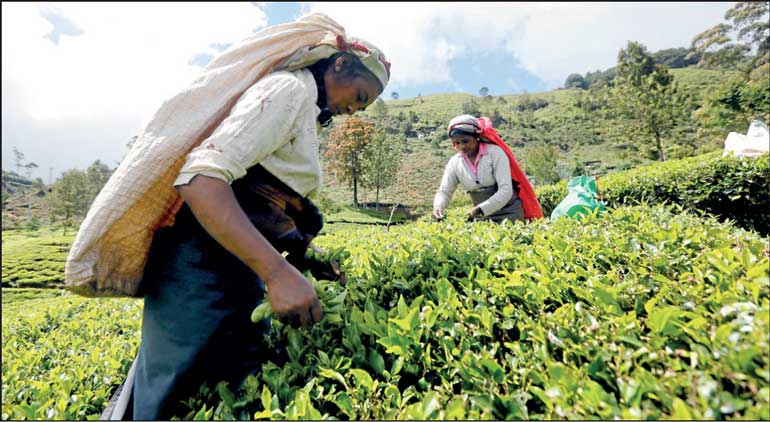Sunday Feb 22, 2026
Sunday Feb 22, 2026
Wednesday, 12 June 2024 00:00 - - {{hitsCtrl.values.hits}}

By Charumini de Silva
Despite the Government’s threats to take over estates managed by Regional Plantation Companies (RPCs) that do not comply with the mandated wage increase to Rs. 1,700, it has been revealed that State-owned Janatha Estate Development Board (JEDB) and Sri Lanka State Plantation Corporation (SLSPC) have not adhered to this directive.
Sources within the JEDB and SLSPC, confirmed that they have not paid their workers the stipulated Rs. 1,700 daily wage as per the Government’s gazette.
“The workers seem alright with the Rs. 1,000 wage. So far no complaints,” they told the Daily FT on the condition of anonymity.
As per them, at present with the Employees’ Provident Fund (EPF) and Employees’ Trust Fund (ETF) contributions, workers receive a total of Rs. 1,150 per day, with an additional Rs. 40 per kilo for plucking over the 20 kg set target.
However, the State-run Elkaduwa Plantation Ltd. has taken steps to pay the increased wage to its 1,500 workers.
Elkaduwa Plantation Ltd., Chairman Sumith Jayaratne speaking to the media confirmed that they have started to pay the Government directed wage hike for its employees. “Once statutory contributions such as the EPF and ETF are included, the total wage amounts to Rs. 1,902.50,” he added.
When inquired from the Planters’ Association of Ceylon (PA), they said some of the RPCs that condemned the forceful wage hike implementation have adhered to the Government directive, while some have not.
According to Gazette Extraordinary No. 2381/35, issued on 25 April, the daily wage is set at Rs. 1,350, with an additional Rs. 350 to total Rs. 1,700, plus Rs. 80 for each extra kilo plucked.
The Planters’ Association of Ceylon has criticised this directive, proposing instead a daily wage of Rs. 1,380 with a 50% increase for over-kilo plucking, arguing that the Government’s mandate is financially unsustainable.
Many criticised the Government’s pressure on RPCs to meet the wage hike, while the lack of compliance within its own State-owned plantations highlights the complex challenges and financial constraints facing the entire plantation sector.
The RPCs have pointed out that they are unable to pay such an increase in wages as the costs of tea production would be higher than the prices fetched in the market.
They claimed that the wage hike will impose an annual financial burden exceeding Rs. 35 billion on RPCs, including EPF, ETF and gratuity payments.
Last week, the Cabinet approved a Rs. 5 billion allocation to settle the arrears of EPF and ETF, including interest, for State-run estate employees in response to the financial strains.
State Minister of Finance Ranjith Siyambalapitiya noted that these arrears have accumulated over a decade, affecting employees of the SLSPC, JEDB and Elkaduwa Plantation Ltd.
He highlighted the severe hardships faced by many workers due to the non-payment of their EPF and ETF contributions, with over 2,000 legal cases filed by affected employees over the years.
Several Ministers have openly threatened to take over the estates managed by RPCs that do not pay the increased wage.
On 28 May, Cabinet Co-Spokesman and Minister Bandula Gunawardena said the Government will soon announce its stance on RPCs that have failed to implement the minimum wage hike, following the completion of a report by a Cabinet-approved Special Committee.
On 23 May, the Cabinet of Ministers approved a proposal by President Ranil Wickremesinghe, in his capacity as the Finance, Economic Stabilisation and National Policies Minister, to form a special committee. The committee, headed by the Secretary to the President and Treasury Secretary, has been tasked with studying various issues, including the potential introduction of laws to cancel lease agreements of State-owned estate companies with poor management that are unable to pay salaries.
“Some of the plantation companies have informed the Government that they cannot afford the increased wages,” Gunawardena noted.
Last month, the plantation industry stakeholders holding a collective media briefing claimed that even prior to the Government’s wage hike directive, the tea and rubber sector workers were already paid the single highest minimum wage across all 48 regulated by the Wages Board, including; tea smallholders, garments, tea export trade, manufacturing industry, nursing, pre-school teachers and security services.
With the latest minimum wage hike being compelled from the industry, tea and rubber wages will now be 2.4 to four times greater than any of the other sectors regulated by the Wages Board, they pointed out.
They also stressed that the RPCs are listed companies on the Colombo Stock Exchange (CSE) and any attempt at expropriation by the Government would contravene Securities and Exchange Commission (SEC) rules, the Companies Act and other related statutory provisions.
The Planters’ Association of Ceylon also noted that the current approach of the Government in attempting to coercively set wages for the private sector and interfere in management of the sector from key Government figures, represent a stark violation of the terms of the International Monetary Fund (IMF) agreement, which is crucial for Sri Lanka’s economic recovery.
